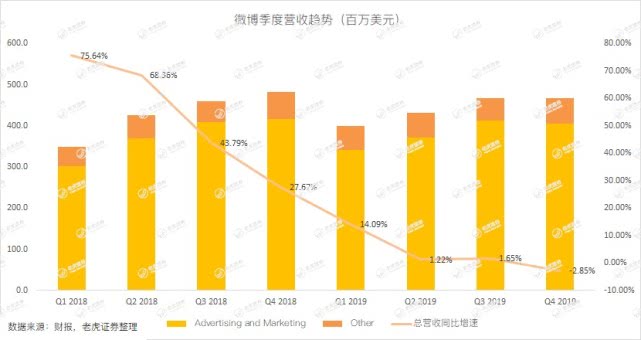On the evening of February 26th, Weibo released its fourth quarter financial report, which was less than the expected full-year net profit and the impact of the new crown epidemic on the first quarter performance, allowing investors to vote with their feet quickly. The company’s stock price fell 14.7% before the market.
This article was published in the Tiger Securities Community, which is a community section of Tiger Trade, a stock trading software owned by Tiger Securities
In the evening of February 26th, Weibo released the fourth quarter financial report, which was lower than the expected full-year net profit and the impact of the new crown epidemic on the first quarter performance, allowing investors to vote with their feet quickly. The company’s stock price fell 14.7 before the market. %.
After the listing, the first year of revenue has turned negative year-on-year, the epidemic is overdue and panic.
Finance report data shows that Weibo ’s fourth-quarter revenue was US $ 468.1 million, a decrease of 2.8% year-on-year, and was lower than analysts ’expectations of US $ 468.9 million; adjusted EPS was US $ 0.77, beating analysts’ expectations of US $ 0.72.
Despite widespread concerns about Weibo ’s growth, the year-on-year change in revenue from positive to negative was the first time since Weibo’s listing.

Tiger Securities Investment Research team blames Weibo’s weak revenue for its advertising business, which accounts for nearly 90% of its exposure to macroeconomic influences. With domestic growth rates reaching lows in recent years, advertiser demand has weakened. What is more worth mentioning is that fierce competition from news aggregation and short video platforms has kept its growth under pressure.
Under this background, the new crown virus epidemic brought Weibo’s management to sharply reduce the guidance for the first quarter, and it was more pessimistic:
Due to the high degree of uncertainty in the epidemic situation, the company’s visibility on the impact of revenue is limited; based on the current best estimate, calculated at a fixed exchange rate, Weibo expects that net income in the first quarter of 2020 will decrease by 15% year-on-year to 20%.
As mentioned earlier, the Tiger Securities investment research team believes that the epidemic situation has a negative impact on overall advertising expenditures, and that the impact on advertising expenditures of SMEs is often more lethal than that of KA advertisers. For SME advertising, while some smaller categories such as gaming and online education will benefit, top categories such as local services and e-commerce will face tremendous pressure. For KA ads, FMCG and Internet services will see mixed effects, while cars and entertainment will be hit. This makes the market more conservative about the growth of advertising revenue in the first quarter of 2020 and the full year of 2020.
User parametersWith the decline in the degree, the weak growth of ARPU is a greater concern
If the macro economy of the advertising market is more an external cause, it will eventually pass, and the changes in user growth and participation are more worthy of attention by investors who pay attention to Weibo.
The number of monthly active users (MAUs) of Weibo in the fourth quarter was 516 million, an increase of 11.7% year-on-year; the number of daily active users (DAUs) was 222 million, an increase of 11.0% year-on-year. The downward trend of MAU and DAU growth has not changed, but fortunately, both have improved compared to the previous quarter.
However, user participation has not improved, and the downside this quarter came to 43.02%.
The lack of improvement is worrying as companies have shown that they are investing in engagement. Weibo has been promoting content to boost traffic by optimizing thematic products and enhancing the distribution and collaboration of popular search topics. In addition, new event discussions have been added, and community social features have been developed. All new features designed to attract user engagement have not yet proven their effectiveness.
As a result of poor indicators, revenue per user (ARPU) continued to decline this quarter, down 13% year-on-year.
Tiger Securities Investment Research team believes that the negative impact of user growth and engagement will make advertisers more inclined to shift their budgets to competing platforms such as Douyin, which will have a further negative impact on monetization and lower valuations .
Last
On the positive side, there has been a gratifying increase in the traffic related to the epidemic during the Spring Festival, which shows the media value of Weibo.
Since the outbreak, the average daily number of bloggers has increased by 25% year-on-year. However, the current focus in the field of online advertising is more focused on the demand side (willingness and ability to consume) than on the supply side (flow rate and Time), which makes the company unlikely to benefit from traffic growth in the short term, and the era of Weibo may be ending.
Considering that the company’s current valuation is at a historical and low level in the industry, the potential marginal improvement in performance brought by the optimization of its advertising technology system and the new live e-commerce business in the next year is worthy of attention.
This article does not constitute and should not be construed as any agreement, offer, invitation to offer, opinion or suggestion to purchase securities or other financial products. Nothing in this article constitutes an investment, legal, accounting or taxation opinion of Tiger Securities, nor does it constitute a statement of whether an investment or strategy is suitable for your personal circumstances, or any other recommendation for you personally.